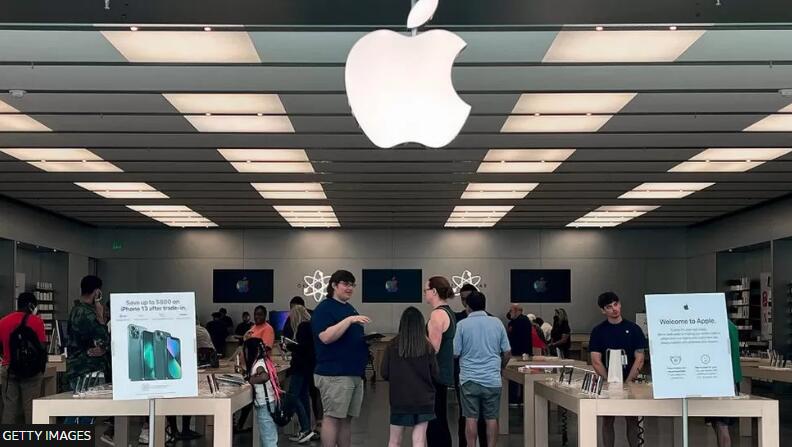Unionised US Apple Store proposes asking for tips
The team at Apple’s Genius Bar hands you your phone back within hours – with a hefty bill. But as you proceed to make the payment, there’s a new option on the check-out menu: Would you like to add a tip?
An unusual request, but it could soon become real.
Employees at the first-ever unionised Apple Store in the US are proposing to provide customers with the option to tip for service.
The proposal, first reported earlier this week by Bloomberg, has sparked debate about tipping culture in the United States and so-called “tipping fatigue”.
In a series of tweets, the union acknowledged the idea could be “a little controversial”.
“Apple employees everywhere can tell you that they are already being offered tips by customers,” the union representing the store in suburban Baltimore said.
As it stands, if an Apple employee accepts a tip, he or she could be fired. The new proposal would create a system that allows “occasional” customers to reward the team without fear of termination, according to the Union.
Making customers feel “guilt tipped” when they decline to add a few extra dollars to a purchase, is part of a business model that’s emerging around American tipping culture in the wake of the pandemic, say experts.
“It’s tipping everything, everywhere, all at once,” said Thomas Farley, an etiquette expert popularly known as ‘Mister Manners’.
The Towson, Maryland Apple Store became the first in the country to unionise in 2022. Apple store employees, and its labour union, The Coalition of Organised Retail Employees (CORE) are currently engaged in contract negotiations with the tech giant and said they expect “there will be compromises made”.
The tipping scheme proposed would offer customers options ranging from “no tip, 3%, 5%, custom amount”, the Union said. Any funds collected through tips would be split among the team members.
‘Tipping invasion’
But on social media, backlash to the proposed tipping scheme was swift, with many noting that tips are generally offered to workers who make low hourly-wages.
Consumers tipped an average 19.6% at full-service restaurants, according to a report from Toast, a point-of-sale service platform.
Etiquette expert Mr Farley said technology is the primary driver behind this “tipping invasion”. As more companies adopt digital payment systems, like Square and Toast, consumers are often being prompted to add a tip after completing a transaction.
“My fear is that we’re rapidly advancing toward a culture where we’re expected to tip for absolutely everything,” he said.
A survey of American tipping culture found more than half of Americans said they gave a tip “when they normally wouldn’t” because they were prompted by the check-out system.
Mr Farley said the rise in demand for tips has become commonplace, in part, because businesses have used the prospect of tips to entice workers in a tight labour market instead of offering higher wages.
Generally, these workers make less than minimum wage and rely on tips to make a living, he said.
“These are instances where I would absolutely not be miserly, as long as your budget allows,” he said, but in situation where you know the server is likely making above minimum wage, a tip is discretionary.
“Just because it’s there on a screen doesn’t mean you have to, although I know hitting ‘no tip’ makes you feel like Scrooge,” he said. “That’s the idea of a guilt tip.”
